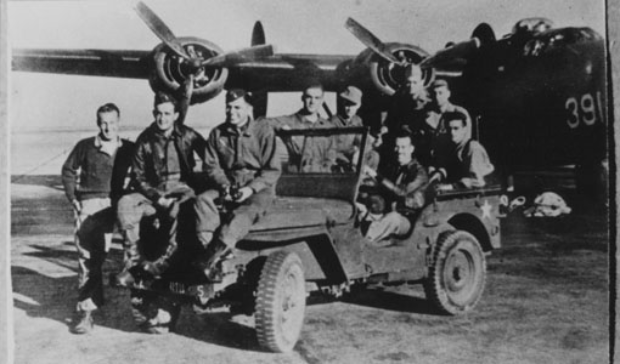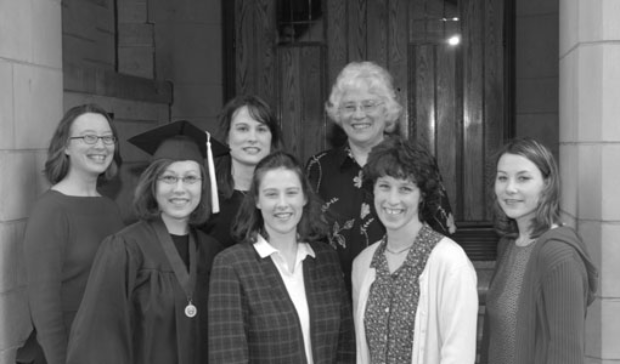Kevin Gellerman reached out while a French villager handed him a worn valve dug up from his grandfather's downed B-24 Liberator. To Gellerman, it was the first tangible connection he had ever made with his grandfather.
"It was very hard not to break down and cry," said Gellerman '92, a St. Thomas economics alumnus who spent the past five years searching for the true story behind the death of his grandfather, Tech Sgt. Norman Gellerman, a flight engineer of the 482nd Heavy Bomb Group who was killed during World War II.
Ironically, many pieces of the story Gellerman sought were both remembered and celebrated in small circles sparsely scattered throughout America and Europe. But finding the connections took time.
Gellerman's search began as a simple curiosity. "As I was growing up, I heard rumors that my grandfather saved his crew before his bomber exploded, killing him," said Gellerman. "I wanted to confirm or debunk these rumors."
During a business trip in April 1999 for his employer, Walden University, Gellerman gathered his first lead at Arlington National Cemetery, where he asked a clerk for information about his grandfather. "I got a little purple sticky-note with some basic information," Gellerman said. "I learned he was in the 8th Army Air Force, 482nd Bomb Group, and that he was buried in Normandy, but there was no official story about his death."
An Internet search led Gellerman to Mendota Heights, Minn., resident Ed Kueppers, a historian for the 8th Army Air Force, who had little information to add. He suggested that Gellerman visit the National Archives for more answers. Gellerman went there during a business trip to Baltimore in November 2001.
"I saw his name on five mission reports in a couple boxes worth of materials," Gellerman said. "But the information I got was a mystery. I found his name on papers from the 492nd Bomb Group, nicknamed the Carpetbaggers, not the 482nd. On his fifth and last mission, my grandfather was listed as missing in action."
Confused and seemingly out of leads, Gellerman became desperate for answers. "I actually wrote Paul Wellstone, but his staff called and said they were unable to help."
Help came in the form of an unusual gift. Gellerman's sister-in-law, Janelle Todd, 39, who heard of the Carpetbaggers during a conversation with Gellerman's wife, decided to research the group on the Internet as a Christmas present.
"Janelle called me at our Christmas dinner and said, 'I found all this information on the Internet É and your grandfather's name is in it,'" Gellerman said. "My jaw hit the ground. From there, the floodgates opened."
With the help of a Webmaster, Kevin Gellerman quickly made contact with several figures who studied the Carpetbaggers' history, including the Norman Gellerman incident. Among them were Dr. Jean-Pierre Ducellier, 66, a retired French physician and historian whose father aided injured members of Norman Gellerman's bomber crew on the night he was killed, and Jean Schmidt, 74, a French farmer who unearthed wreckage of the B-24 Liberator in which Norman Gellerman died.
"Every time I got a new piece of information, I was giddy – and at times tearful," Gellerman said. "I was finally able to understand what happened to him.
"The Carpetbaggers flew classified missions, airlifting supplies to the French Resistance in Nazi-occupied France. His bomber was hit by flak from German forces on their way back from a mission. Three engines were on fire, and he went down below to shut off the fuel lines to save the crew from burning during impact. In a sense, the story was true. He did save his crew members. Everyone except my grandfather survived."
Gellerman also was led to a Carpetbagger organization run by surviving members of the 492nd Bomb Group. Through the organization, Gellerman learned that two crew members of his grandfather's B-24 Liberator were still alive, 2nd Lt. Frederick Kelly, co-pilot, and 2nd Lt. Ed Shevlin, bombardier. Gellerman immediately began his correspondence.
"It was amazing," Gellerman said. "I sent the letters off on a Monday. The next day, I got calls from each of them. I had that giddy feeling again.
"They only flew with him for a few missions, so they couldn't say much. But when you have nothing, every piece of information means a lot. I learned his nickname was 'Boss,' because in the air, he was in charge. I also learned my grandfather had a premonition that he wasn't coming back from his final mission. Before he took off, he gave away most of his possessions."
To Kevin Gellerman's surprise, Ducellier told him of a memorial constructed in honor of Norman Gellerman who died supporting the French Resistance. The memorial was placed in the small village of Hem-Hardinval, 100 miles north of Paris, where Gellerman's B-24 Liberator crashed.
Ducellier invited Kevin Gellerman to be a guest of honor at a service memorializing the 60th anniversary of Norman Gellerman's death. He enthusiastically accepted.
On March 2, 2004, Gellerman and longtime friends Luke Taylor '93, M.B.C. '03, an amateur filmmaker, and Cheryl Taylor '93, visited Hem-Hardinval to document and participate in the memorial service, which was attended by villagers, local civic leaders and members of the French military.
"It was overwhelming to see the people who were so generous and so helpful with my search," Gellerman said. "I was more worried about social taboos. I wanted to let it play out how they would interact with me. But inside, it was very exciting."
At a reception after the ceremony, Gellerman met with Jean Schmidt, who was carrying a container full of curious parts and mechanisms. Among them were two items of special significance – a valve and some window rivets.
"The valve was not necessarily the one to stop the fuel leak, but it was on the plane, and my grandfather touched it," Gellerman said. "The window rivets might have been part of the bomb bay, near where he was when he died.
"It's kind of a spiritual connection. I was able to have a connection in the respect that my grandfather had some interaction with these pieces and I can interact with them too."
Gellerman described his search as a personal journey.
"Who I am and what I'm like, you get those traits from your father and mother," he said. "My father got those traits from my grandfather and grandmother. Any information about him would explain my dad, which would explain about me." Kevin's father, Norman R. Gellerman '67, M.B.A. '80, runs Sports Lettering of MN Inc.
"Words cannot describe how very proud I am of Kevin and all the research he has done concerning the circumstances of my father's death in WWII," his father said. "I was born three months after my father's death and the only information I had about my biological father was his name, a photo and a few medals. I was raised by a great stepdad and had no reason to research my father or his death. I am very glad Kevin did this because now my dad's brothers and sisters and their families, my mother, my other sons and Kevin's family know that there is a monument honoring Norman in a small town in France. Many also have some souvenirs from his plane and the dirt from the farm where he crashed. Kevin has given me a very special gift, a gift of information about the man I was named after."
The experience was an important accomplishment for Gellerman. "I didn't want to be old and look back at my life wishing I had searched further," he said. "This is one of those top five things you want to accomplish when you look back at the end of your life."
Shortly after the ceremony in Hem-Hardinval, Gellerman visited the Normandy American Cemetery, where he was led to his grandfather's grave marker by grounds staff. As the staff person left, Gellerman silently stood alone as the rain softly pelted on his grandfather's grave. It was an emotional, fulfilling moment in the journey to discover his roots.
Gellerman recounted what he said to himself in the moment. "I'm honored to be your next of kin."
Kevin Gellerman lives in Inver Grove Heights, with his wife, Pati (Todd) Gellerman '92, and children Kaitlyn, Matthew and Patrick. He is employed by Laureate Education Inc., formerly Sylvan Learning Systems Inc., a parent company of Walden University.
Gellerman's story will be the subject of a short documentary, which will be circulated in various state and regional film festivals. For more information, contact Luke Taylor: luke@uptoncreative.com.
Phil Bogdan is a student in the Master of Business Communication (MBC) program at St. Thomas and an editor at CaptionMax. He lives in Savage, Minn., with his wife, K.C.







